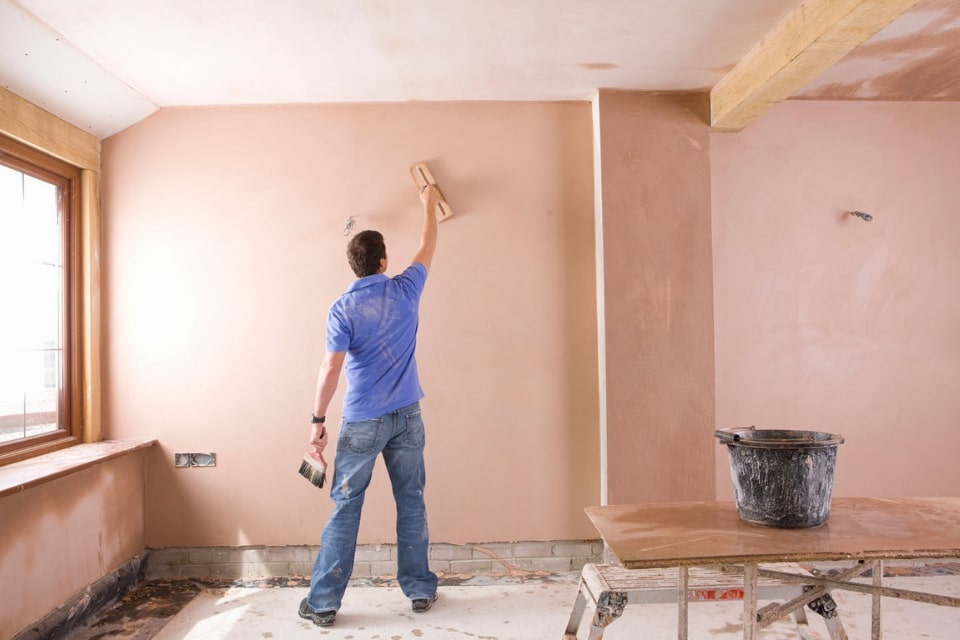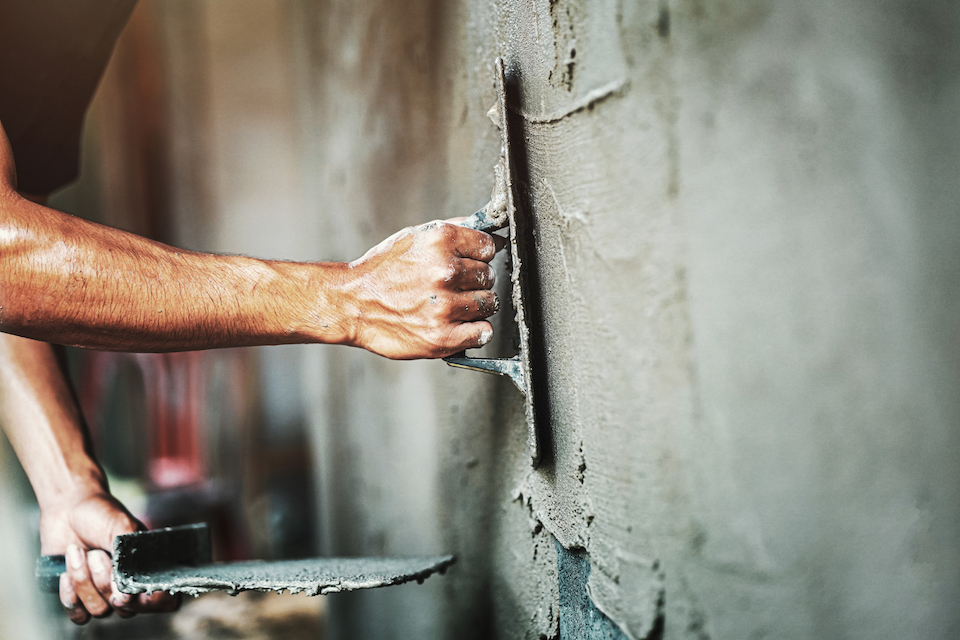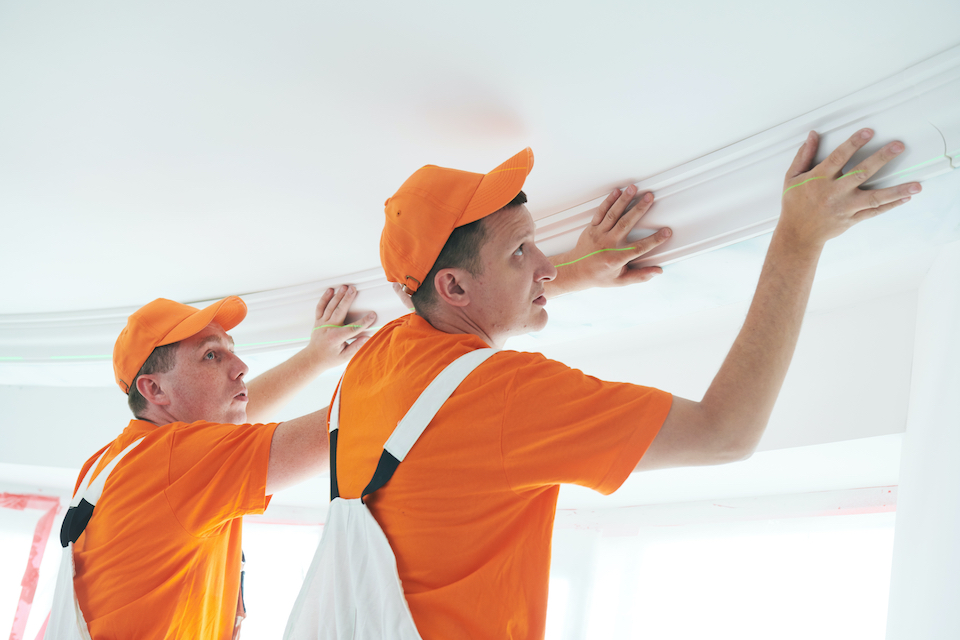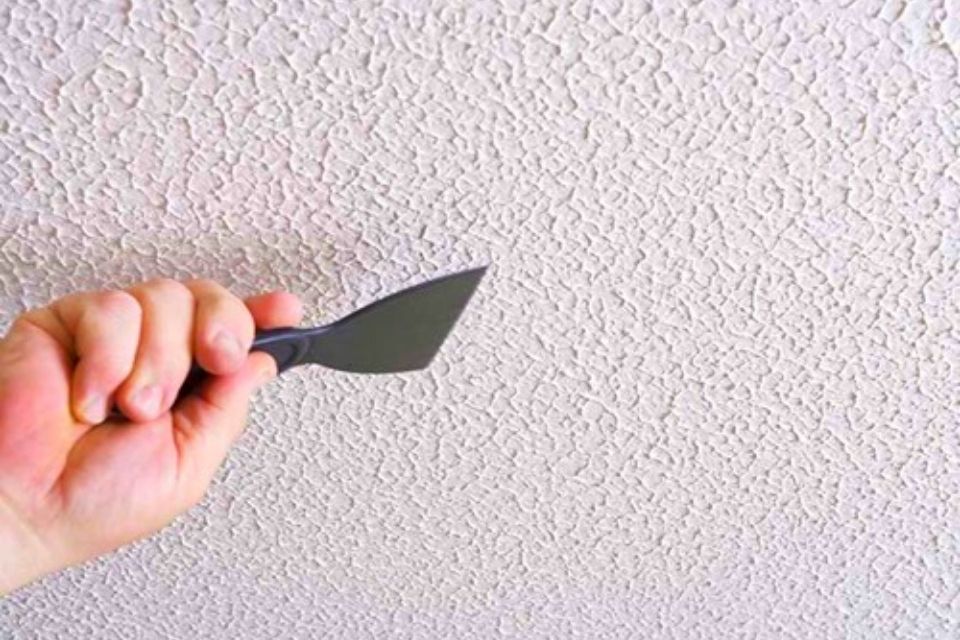How Much to Plaster a Room?
The cost of plastering an average room can range from £300 to £1,200, depending on factors such as the condition of the wall and type of plaster that may be required.
Alternatively, on the assumption it's a relatively straightforward job, plastering a single wall can cost as little as £100 to £200. Whereas if you wish to just have the ceiling plastered, you can expect to pay around £300 to £500 (again, based on an average-sized room).
Are you looking to have new plastering installed? Or would you simply like to know the cost of having plaster repaired?
Our guide to plastering costs will cover a wide range of topics, including a breakdown of the supply and labour costs of having new plastering installed.
In terms of the labour costs, we will look at the average price to plaster a room, the cost to plaster a wall and the cost to plaster ceiling among other plastering jobs.
We will look at the supply costs for various types of plaster and look at other topics such as the plaster skim price and how much it might be to have plaster removed.
This guide will prove helpful if you plan to have new plastering installed or if you would simply like to expand your knowledge of the subject.
Check out this article if you're wondering what can you plaster over.
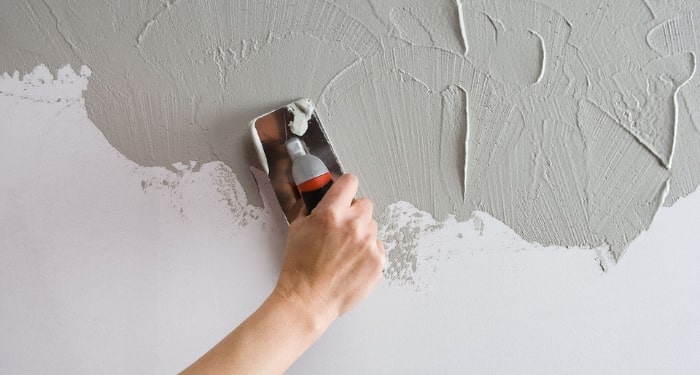
For this section, we will discuss the cost of having plastering installed, including both the labour/installation costs and supply costs.
We will look at these prices in terms of the average, estimated costs and on the basis of different types of plastering jobs such as single wall plastering and ceiling plastering.
How much you will need to spend in practice will also depend on factors such as where in the UK you live and how large the surface is that needs to be plastered.
What are the Supply Costs of Plastering?
The focus of this section is specifically the supply costs of plastering as if you were to purchase directly from the retailer. Therefore, these costs exclude any labour/installation costs and are the price of materials only.
Below we take a look at the cost of the different types of plasterboard that are available:
| Plasterboard Type | Cost Range per m² |
|---|---|
| Moisture resistant plasterboards | £10 – £15 |
| Fire-resistant plasterboards | £15 – £35 |
| Acoustic plasterboards | £20 – £30 |
| Insulated plasterboard | £20 – £60 |
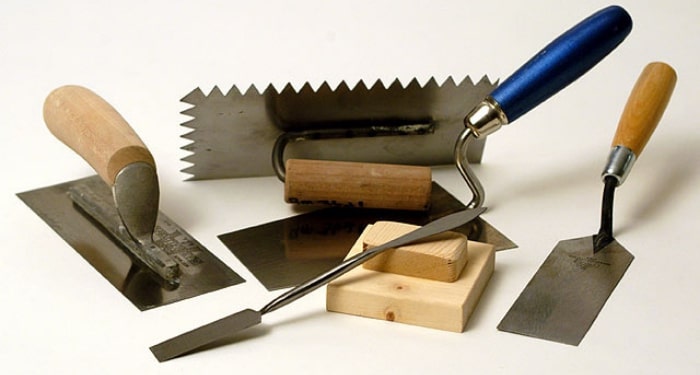
Aside from plasterboards mentioned above, along with bonding agents (£15 to £25 per 5 litres) and plaster tape (£0.05 to £0.50 per metre), other potential material costs come in the form of the following types of plaster:
| Plaster Type | Cost Range |
|---|---|
| Finishing plaster | £0.20 – £0.90 |
| Browning plaster | £0.40 – £1.60 |
| Undercoat plaster | £0.70 – £1.20 |
| Textured plaster | £1.00 – £2.00 |
| Hardwall plaster | £0.50 – £3.00 |
| One coat plaster | £0.90 – £3.00 |
| Ready-mixed plaster | £1.40 – £4.20 |
Labour Costs for Plastering
In this section, we will break down the labour and tradesmen costs involved in having new plastering installed. Please note these labour costs exclude materials and are based on average UK tradesmen rates.
| Plastering Job | Cost Range |
|---|---|
| Small patch repairs | £70 – £130 |
| Plaster a single wall | £100 – £200 |
| Plaster a ceiling | £150 – £750 |
| Skim an entire room | £400 – £700 |
| Plaster a whole room | £700 – £1,200 |
| Plaster two average-sized rooms | £800 – £1,500 |
Please note labour costs may vary, depending on the exact size of the job, any repair work and the type of plaster used. The location of your property will also make a difference, with prices in cities such as London often considerably higher than the national average.
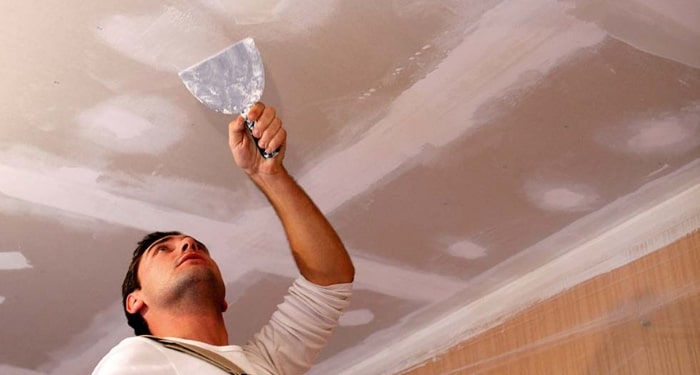
What are the Additional Costs of Plastering?
We will now discuss the costs of some additional work you may choose to avail of.
Interior Painting & Decorating
After having new plastering installed, you may wish to have the room painted and decorated.
This can be achieved through paint and decoration work. To have a single medium-sized room painted, you should budget for a cost of around £130 to £300.
Decorating work, like painting, tends to cost about £14 to £18 per hour, thus how much you can expect to pay for decorating will depend on the extent of the work you wish to have undertaken.
You likely won’t incur an additional flat rate since this work will be done on top of the plastering work.
New Skirting Boards
It will likely cost you about £300 to £500 to have new skirting boards installed.
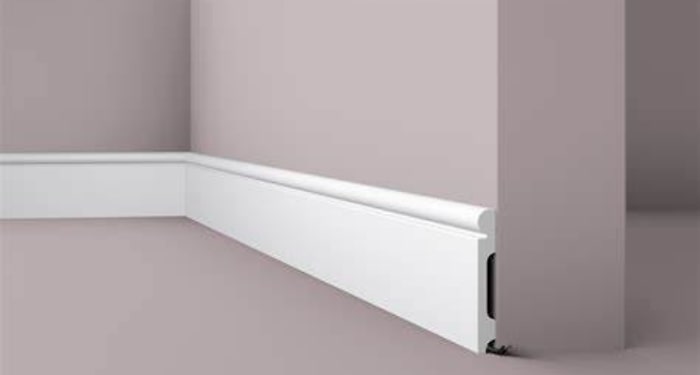
If you require that the skirting boards be painted or if a room full of furniture needs to be cleared before work can begin, you can expect to pay more due to these additional expenses.
New Flooring
Depending on the surface area your new flooring needs to cover, it will likely cost about £720 to £2,900 to have new wood flooring installed.
For the installation of laminate flooring, you can expect to pay somewhere in the range of £375 to £1,625, assuming a room that has an area of 5 metres x 5 metres.
To have vinyl flooring installed will likely cost you around £110 to £1,125.
Other jobs that you may need doing at the same time include:
- Coving £300-£400
- Ceiling Repair £400-£1,000
- Wallpaper Removal £150-£650
- Damp Proofing£300-£2,500
Types of Plaster
We will now delve into further detail regarding the various types of plaster and their cost price. We will explain what each type of plaster is, when/what it is used for and list out their pros and cons.
It will then cost you an additional £10 to £20 for every hour beyond the first two.
Undercoat Plaster Cost
Undercoat plaster is probably going to cost you about £0.70 to £1.20 per kg.
This type of plaster acts as the initial coating on a new wall. It is often used on dense surfaces, low-suction surfaces, surfaces which have been treated with a bonding agent, brickwork, concrete and blockwork although it is suited to many different types of walls.
Pros:
- Can be used on many different surface types.
- Many undercoat plaster products are relatively cheap to purchase.
- Builds up the thickness of the wall.
Cons:
- Only designed as a first coat, not the final finish.
Finishing Plaster Cost
In terms of supply costs, finishing plaster will cost around £0.20 to £0.90 per kg.
It is used for low to medium suction surfaces and as the final layer of plaster on a surface. Once it has dried, painting or/and decoration can then be applied.
Pros:
- One of the cheaper types of plaster
- Can provide a smooth and high-quality finish if you purchase the right product
- Can be used on many low to medium suction surfaces
Cons:
- Not well suited to low-suction backgrounds
Bonding Plaster Cost
To purchase bonding plaster will likely cost you about £2 to £3 per kg.
This form of plaster is a type of undercoat plaster. It is a particularly versatile type of plaster and often applied to walls or ceilings as an undercoat.
The cheapest bonding plaster products (often less than £2 per kg) can be found through online stores such as eBay and Amazon although on eBay many products appear to be second-hand.
Pros:
- High level of versatility
- Works on many different types of surfaces
Cons:
- Generally not as cheap as most undercoat plaster products or finishing plaster
- More limited sales than other types of plaster
Hardwall Plaster Cost
In terms of its material costs, hardwall plaster is available for about £0.50 to £3 per kg.
Another type of undercoat plaster, hardwall plaster offers a strong level of impact resistance and a rapid drying time. It is the most commonly used type of undercoat plaster. It can be used as an undercoat on most surfaces as the first layer of plaster.
Pros:
- Resistant to impacts
- Rapid drying time
- Very common
- Can insulate sound
Cons:
- Some hardwall plaster products may be relatively expensive
One Coat Plaster Cost
You’ll likely need to spend about £0.90 to £3 per kg for one coat plaster.
It can act as an undercoat or a finishing plaster. It may be used on a wide range of indoor surfaces such as brick, blockwork, concrete and plasterboard.
Pros:
- Can be used as an undercoat or finishing plaster
- Not too expensive
Cons:
- Not suitable for outdoor use
Browning Plaster Cost
Expect to pay between £0.40 and £1.60 per kg for browning plaster.
Browning plaster is another example of an undercoat plaster. It tends to be pink or grey in colour. It is often used on surfaces like bricks and building blocks. It is well suited to various other absorbent surfaces.
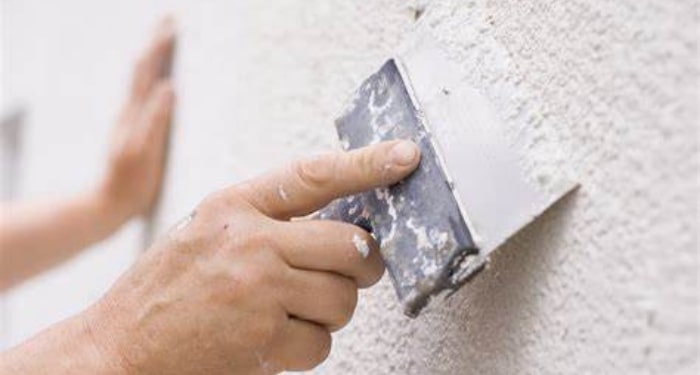
Pros:
- Inexpensive type of plaster
- Commonly used
- Suitable for many absorbent surfaces
Cons:
- Not designed for exterior use
Textured Plaster Cost
The cost of textured plaster is about £1 to £2 per kg.
This plaster type is any finish that has a complex surface which has not been polished, giving it a textured look and feel.
It is used as the final layer of plaster on a surface.
Pros:
- Offers an interesting plaster finish to a surface
- Not particularly expensive
- A textured wall can hide blemishes and imperfections well
Cons:
- May prove more difficult to repair
Ready-mixed Plaster Cost
Generally, ready-mixed plaster is used for interior surfaces. It’s going to cost you about £1.40 to £4.20 per kg.
A ready-mixed plaster is that which is prepared and made to have a light consistency so that minimal preparation will be required on your part or on the part of a hired professional to start working with it.
Pros:
- Does not require as much preparation
- Comes with a light ready-made consistency
- Ready-mixed plaster can be employed for quick repair work
Cons:
- Can be quite expensive
- Not usually suitable for exterior use
Damp-Resistant Plaster Cost
It will likely cost you between £1 and £2 per kg to purchase a damp-resistant plaster product.
This type of plaster, as the name suggests, is designed to reduce moisture/dampness levels on a surface. It can also help to prevent salt migration inside the walls.
It is often used in houses with high moisture levels.
Pros:
- Can reduce dampness levels on a surface
- Damp-resistant plaster can also prevent or reduce salt migration in walls
- Relatively cheap
Cons:
- Not as many products are available online as compared to many other types of plaster
Patching Plaster Cost
Patching plaster may cost anywhere from £1.70 to £10 per kg. While some products are in the lower end of this range, many costly products are available for about £6 to £8 for a kilogram.
Patching plaster is designed to give surfaces a smooth look and feel as well as increase the strength and firmness of walls.
It may be used, as the name infers, to fix patches in a surface although patching plaster may simply be used to improve the quality of the background as a whole.
While these are quite expensive, you may not need to use too much patching plaster thus for a given bag of patching plaster; you may find it is no greater than the bags of plaster price for most products.
Pros:
- Patching plaster can give a surface a smooth appearance and feel
- Can increase the strength and firmness of walls
- Can fix patches on a surface
Cons:
- Can be quite expensive
How Long Does It Take to Plaster?
We will now discuss the duration it takes for different plaster jobs to be complete.
The table below looks at the length of time it will take to perform plasterwork such as plastering a single wall, plastering the ceiling and small patch repair work. In this section, we will also discuss the various additional factors that can influence the length of time it will take for plastering work to be complete.
| TASK | DURATION |
|---|---|
| Plastering Single Wall | 3-4 Hours |
| Skimming Whole Room | 1-2 Days |
| Plastering Whole Room | 1-2 Days |
| Plastering Ceiling | 8-12 Hours |
| Plastering Two Rooms | 2-4 Days |
| Small Patch Repairs | 2-3 Hours |
Factors that could influence how long a plastering job will take include the size of the area that needs plastering, the state of the area, whether plasterboards are needed.
You will also need to consider whether it is only skimming that is needed, any waste removal jobs that may prove necessary and whereabouts in the UK you are situated.
How Much Does Repairing Plaster Cost?
For this section, we will discuss how much different types of plaster repairs cost.
First we take a look at a cost summary (which includes materials and labour), before reviewing what is involved for each one in more detail.
Please note these are estimated costs, with the final price depending on the extent of the damage that needs repairing and how much individual tradesmen charge may vary.
| Repair Type | Total Cost |
|---|---|
| Sealing Plaster | £65 – £130 |
| Loose Plaster | £75 – £125 |
| Blown Plaster | £100 – £200 |
| Ceiling Repair | £150 – £200 |
| Holes in Plaster | £150 – £200 |
| Cracks | £200 – £400 |
Ceiling Repair
A ceiling that has a patch is fixed by first removing damaged plaster. Next, a professional will have a perfectly-shaped plaster patch to go in place of where the old plaster was present. Plasterboard nails will then be used to nail the patch to the joists.
A PVA solution will then be employed to keep the new plaster in place before a plasterboard jointing compound can be used over the joint.
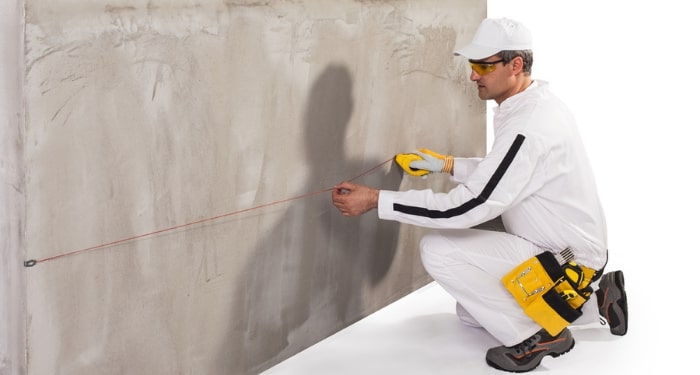
Then, the jointing tape will be pressed into it. An additional and wide layer of compound will be applied with a coating knife. A sponge will then be utilised to feather each of the edges.
After it has dried, it may be sanded and subsequently decorated, the total cost ultimately depending on how much work is required although is likely to be at least a days work.
Cracks
To fix plastering cracks, they will first need to be scored open to their edges, such as with a putty knife. Paper drywall tape will then be cut based on appropriate measurements so that it can fill the crack. A thin layer of joint compound will then be laid over the plaster crack.
The drywall tape will be applied shortly after, directly on top of the crack with a knife of about six inches in length. A joint compound layer then needs to be laid over the taped area. The joint compound will need to cover a few inches beyond the taped area as well as covering the taped area itself.
Next, sandpaper can be used to lightly sand over once the joint compound has dried completely. A third layer of joint compound and additional sanding will then also be used to finish the job.
Waste removal may prove an additional cost.
Holes
One way that a hole in plaster is repaired is by cutting out a square area surrounding the plaster hole so that new plaster can be designed and installed with the exact size necessary to fit the square opening.
Filler or finishing plaster may be used after the new plaster to secure it in place.
Loose Plaster
If the plaster is loose or sagging, it may need to be replaced, and new plaster put in its place, in a similar process as with the other repairs already mentioned.
However, a replacement will not prove necessary if it is only slightly loose.
In this case, the plaster can be reattached with the use of long drywall screws that have plaster washers fitted to them.
The plaster can be reattached into the wood lath, wall studs or ceiling joists depending on the type of surface that is being dealt with.
There may or may not be waste disposal expenses involved which would depend on whether or not you are having old plaster removed.
Sealing Plaster
In order to seal plaster, a sealant such as mist coat will be applied to the plaster. Several coats may be needed.
The labour costs usually include a minimum flat rate of two hours’ work, although the final quote will depend on the surface area that requires plastering.
Blown Plaster
If plaster has become blown, any mould present will need to be removed. The area will then be protected with a damp seal or some form of stain repellent paint before after the area has fully dried, the surface will be repainted.
How Much Does Skimming Cost?
In this section, we will look at what skimming is, when it’s used, how you can tell if your wall requires skimming and the plaster skimming cost.
Skimming is essentially the process of using a finish plaster either on a non-plastered wall or in order to re-plaster a wall. This is achieved by applying a thin coat of plaster.
A skimmed surface is also intended to be particularly smooth. It is often used to add a smooth finish to a wall (whether previously plastered or not) so that paint or wallpaper can be applied well.
You may choose to have a surface skimmed if it is full of imperfections and/or has issues with heat or sound insulation.
You will, of course, need to have the right type of plaster skimmed onto a surface based on what qualities you are seeking to add to your home’s surfaces.
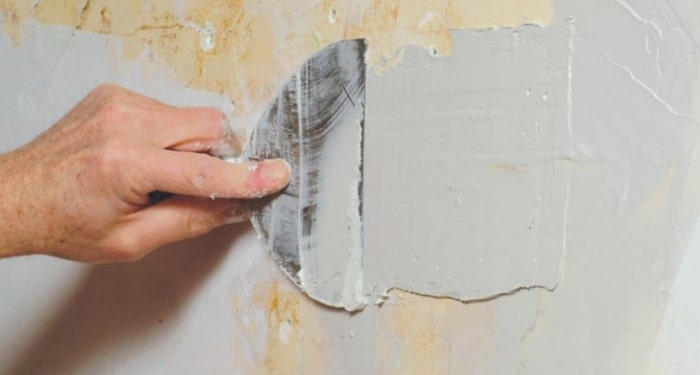
If you wish to install new wallpaper or paint your walls or ceilings, you may find that the surfaces are not sufficiently smooth, in which case skimming could help.
A skimming job will first involve your walls or/and ceilings being prepared, such as with a drywall primer.
Joint compound will then be rolled onto the surfaces before it is smoothed out to achieve a smooth aesthetic. Another layer or two will be added.
After the wall has dried, it may be sanded with sandpaper.
In terms of the skim plaster cost, you can expect the average price to plaster a room through skimming to be around £400 to £700.
How Much Does It Cost to Remove Plaster?
The focus of the final section of our plastering costs guide is the cost of having plaster removed.
You may choose to have plaster removed because it is old and worn beyond repair and needs to be replaced.
In other cases, you may need to remove it for purposes of insulation (for sound or heat) or wiring. It will likely cost you somewhere in the range of £90 to £150 to have old plastering removed, based on the size of an average room in the UK.
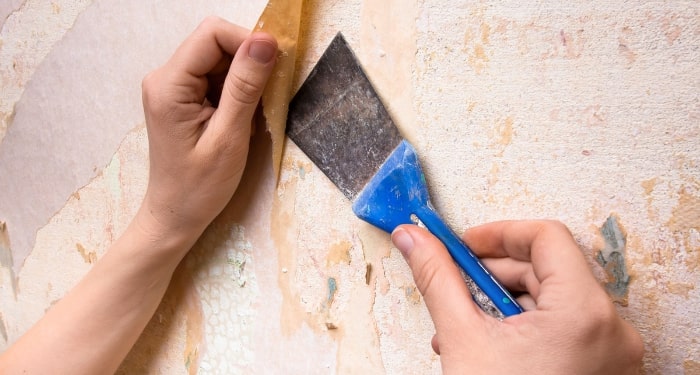
Waste removal costs will probably come to around £50 to £200 depending on how much plastering you have removed and how it is disposed of.
You can dispose of plaster with a skip or through a ‘man and van’ service such as that offered by clear a bee.
FAQs
Q: How long does plaster take to dry?
A: Plaster takes about 4-5 days to dry.
Q: What happens if you paint plaster too soon?
A: If you paint plaster too quickly, it can result in the paint peeling.
Q: Why does plaster crack?
A: Cracks may appear due to the plaster being old, as a result of a poor installation or as a result of the plaster expanding and shrinking while drying.
Q: How much plaster do I need?
A: The amount of plaster you’ll need for a given job will depend on the size of the surface you wish to cover. A plaster coverage calculator can help you figure out how much you’ll need.
Q: How much does plaster cost?
A: Plaster could cost anywhere from £1 to £4 per kg. It depends largely on the type of plaster you choose to purchase and the specific product.

